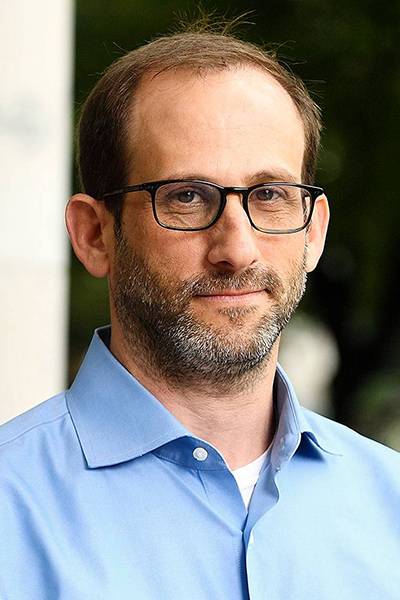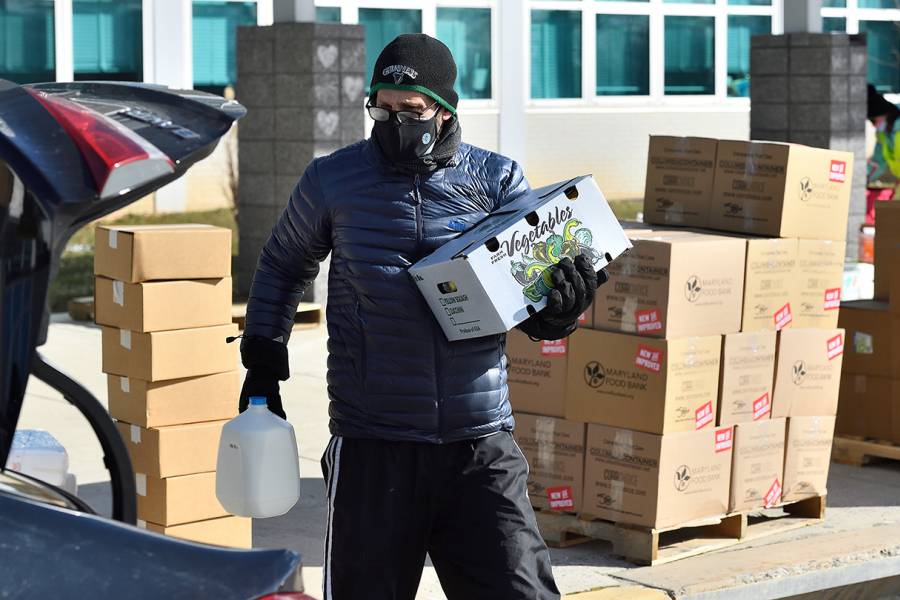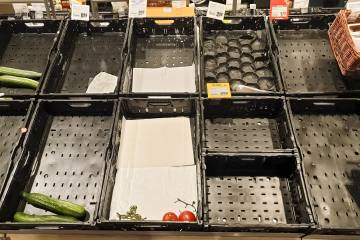As the economic crisis brought on by the pandemic lays bare the precarious financial stability of many American families, Adam Sheingate, a Johns Hopkins professor of political science, is working to make sure government-funded food packages reach Baltimore families in need.

Image caption: Adam Sheingate is a professor of political science in the Kreiger School for Arts and Sciences
The professor behind the popular seminar The Politics of Food, Sheingate has taught students about U.S. food policy and the mechanics of government assistance for more than a decade. Now, as a volunteer with the Baltimore County Student Support Network, he's taken a front-line role in helping distribute COVID-relief packages to Baltimore families.
"It's inspiring to see people come together in times of need, but at the same time, the fact that we rely to such a great extent on this emergency food distribution network tells us about the limitations of our safety net," Sheingate says. "Our social programs, like the Supplemental Nutrition Assistance Program, are still vitally important, but they're not enough to meet the need, and that should tell us something about where our priorities are and where they should be," Sheingate says.
According to data from the January 2021 U.S. Census Bureau's Household Pulse Survey, just under 24 million adults—nearly 11% of all adults in the country—reported that in the past week their household sometimes or often hadn't had enough to eat, a massive increase in need compared to pre-pandemic surveys. Last year, they found that 3.4% of adults reported their household had not enough to eat at some point throughout the entire year.
To supplement governmental food aid, organizations like the Student Support Network are supporting those who would otherwise go hungry. Yara Cheikh, a Hopkins graduate who has volunteered with and coordinated support programs with the organization since its founding, said one of the advantages of the network is its ability to quickly respond to need.
Prior to the pandemic, the Student Support Network operated inside Baltimore County schools, maintaining closets stocked with food, clothes, and health and hygiene products for any student who needed them. When schools moved to virtual learning owing to the pandemic, Cheikh reconfigured their distribution plan to get food and essential items to students directly.
The handout program started in Cheikh's garage a week after schools closed. There, volunteers filled 300 bags of nonperishable food and 150 bags of essential items. The program has more than tripled in size and provides packages with nonperishable and fresh food items and other essentials at three separate Baltimore locations.
When word of the volunteer effort reached Sheingate, a longtime friend of Cheikh's, he immediately volunteered to help. Since April, she says, he's been one of the organization's most reliable volunteers.
"Adam is just a superstar," Cheikh says. "He's been out there every week, and has developed such a strong personal relationship with the people that we serve. He knows the families, and even the pets. He brings such a personal touch to everything that he does."
Originally the Student Support Network relied on donations of nonperishable food, but in March, the federal government passed the CARES Act, providing financial aid and food packages to organizations helping combat hunger. While the government provides access to the food, it is up to the organization to handle distribution. Like the Student Support Network's school closets, these donations are available to families regardless of their ability to demonstrate need.
Sheingate says this accessibility is one of the most important factors of the food distribution program. In his Politics of Food course, he often asks students to attempt to fill out applications for SNAP in their home states, so that they recognize how difficult the forms can be for a family in need.
"The difficulty in seeking assistance from the government reflects a cultural stigma as well as efforts that have been made over the last 30 years to make it more difficult to seek and access social benefits," Sheingate says. "We're so concerned that someone might be getting something they don't deserve that we'll leave people in need."
According to Cheikh, the Student Support Network will continue to hand out food packages until schools reopen, and Sheingate says that he will be out distributing food for as long as they'll have him. This is a unique time in American history, he says, one that he hopes will have an impact on the politics of food moving forward.
"What I hope is that coming out of the pandemic, people have a renewed or even an initial appreciation for what the government does for them or potentially can do for them," Sheingate says. "If we don't have a government that works and that is able to respond to the needs of people in times of crisis, then we're really at sea."
Posted in Politics+Society
Tagged food access, covid-19









